الأسواق
عند تصميم تدخل إنساني وتحديد ما إذا كان سيتم استخدام المساعدات النقدية والقسائم، يجب أن يكون تحليل السوق جزءًا من تحليل الاستجابة الشامل. وثبت أن دعم الأسواق للعمل بشكل جيد يؤدي إلى تعافي أسرع وزيادة المرونة في المناطق المتضررة من الكوارث.
واستثمرت العديد من المنظمات في تطوير أدوات لدعم تحليل السوق وتفكر في البرمجة القائمة على السوق بشكل أكثر شمولية. يشمل ذلك التدخلات التي تستخدم السوق (مثل التحويلات النقدية إلى السكان المتضررين)، بالإضافة إلى التدخلات التي تدعم الأسواق بشكل مباشر (مثل المنح المشروطة للمتداولين لإعادة تشغيل أسواقهم).
Related initiatives
Featured content

Introduction to Market Analysis
دورة تدريبية
This 30 minute online course provides an introduction to the analysis of markets in emergency contexts, with input from some of the world’s leading thinkers on the topic.

A Practical Guide to Market Analysis in Humanitarian response
دورة تدريبية
A three to four hour online course designed to provide future humanitarian market assessment team members with a solid understanding of theory and steps of market assessments so that they can join assessment teams prepared with a basic understanding of what they will be doing and why.
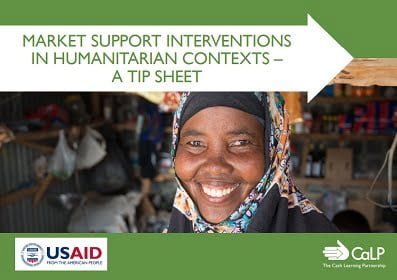
Market Support Interventions in Humanitarian Contexts – a Tip Sheet
Guidelines and Tools
This tip sheet defines what market support programming in humanitarian contexts is, and what it can look like in practice. It enables humanitarian practitioners to systematically consider market support interventions alongside other programme activities. The scope includes support interventions focusing on supply/availability and on demand/access. The tip sheet is based on secondary data...
Latest
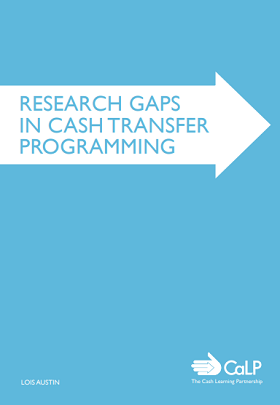
Research gaps in cash transfer programming
Report
Gathering evidence through action research is one of the ways that the CALP Network aims to improve cash transfer programming (CTP) implementation and raise awareness about CTP and its use as an appropriate and effective mechanism for emergency response. Before defining potential research topics for 2014,...

Understanding the Interaction Between Women’s Economic Empowerment and Gender Based Violence: Study on ACF’s cash transfer programme in northern Uganda
Report
This paper presents findings of a qualitative study conducted in Northern Uganda, on the effects of a cash transfer programme on gender relations and GBV in a post – conflict context. The intervention in focus is Action Against Hunger |ACF International (ACF)’s ‘Combating Gender Based Violence and...
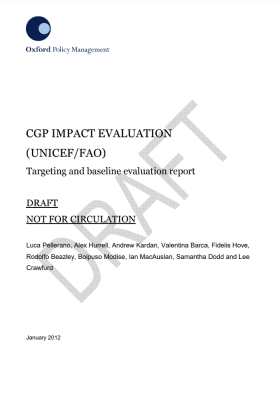
CGP Impact Evaluation (UNICEF/FAO): Targeting and baseline evaluation report
Report
The Child Grants Programme (CGP) is an unconditional cash transfer targeted to poor and vulnerable households in Lesotho. The primary objective of the CGP is to improve the living standards of Orphans and Vulnerable Children (OVC) so as to reduce malnutrition, improve health status, and increase school...
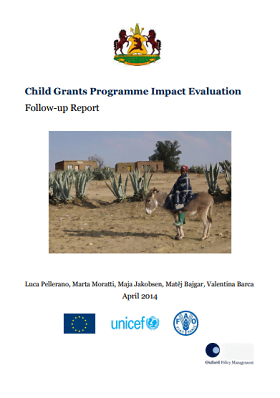
Child Grants Programme Impact Evaluation Follow-up Report
Report
The Lesotho Child Grants Programme (CGP) is an unconditional social cash transfer targeted to poor and vulnerable households. It provides every quarter a regular transfer of between M360 and M7501 to poor households with children that are selected through a combination of Proxy Means Testing (PMT) and...
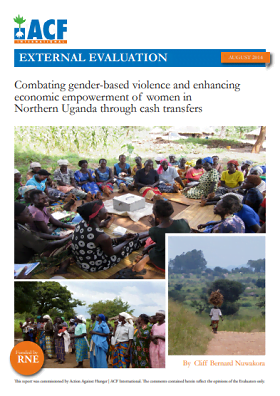
Combating gender-based violence and enhancing economic empowerment of women in Northern Uganda through cash transfers
Report
The aim of this evaluation is to assess the relevance, sustainability, effectiveness and efficiency of the programme. Moreover, the evaluation will assess the impact of the programme on women and girls in relation to livelihoods and economic empowerment and access to social services, including education,...

Evidence of impact of emergency cash transfers on gender and protection
Report
This rapid review gathers together reports which provide evidence on the gendered and protection impacts of cash transfers (CTs) in emergency and humanitarian contexts. It aims to provide a guide to the level and type of evidence which is available, as much of the work written on this topic relies on...

Effects of the Palestinian National Cash Transfer Programme on Children and Adolescents
Report
Over the past two decades, social protection programmes have been implemented in many developing countries to reduce poverty and vulnerabilities in the face of context-specific challenges such as economic crises,inequality and exclusion, and human development deficits. The multidimensional...
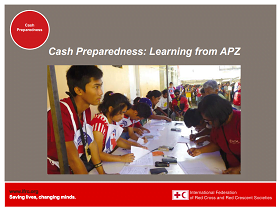
Cash Preparedness: Learning from APZ
Report
Cash Preparedness: Learning from APZ

Market Analysis for Preparedness: The urban informal settlements of Nairobi
Report
The last few years have seen a significant change in the way humanitarian organisations approach response design. Partly spurred on by the growth in cash transfer programming and market-based programming, the practice of working through and supporting local markets is now widely considered best practice...
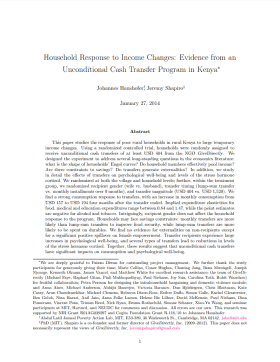
Household Response to Income Changes: Evidence from an unconditional cash transfer program in Kenya
Report
This paper studies the response of poor rural households in rural Kenya to large temporary income changes. Using a randomized controlled trial, households were randomly assigned to receive unconditional cash transfers of at least USD 404 from the NGO GiveDirectly. We designed the experiment to address...

Is Cash Transfer Programming ‘Fit for the Future’? – Executive Summary
Report
This summary presents the results of a 2013 research study entitled, Is Cash Transfer Programming ‘Fit for the Future’? The research was commissioned by the the CALP Network and undertaken by the Humanitarian Futures Programme (HFP), King’s College London. The project intends to understand...

Cash-Based Assistance Programmes for Internally Displaced Persons in the Kabul Informal Settlements
Report
To improve aid delivery and effectiveness, Welthungerhilfe (WHH) piloted during the 2013/2014 winter a mobile-based cash assistance programme aimed at supporting IDP families living in the Kabul informal settlements (KIS) using Roshan’s M-PAISA service. To assess the strengths and...

Sector Indicator Guidance for Programming
Guidelines and Tools
The country Programming Instructions that were sent to EU Delegations and HQ services in mid-May 2012 for the programming period 2014-2020, requested the EU Delegations and services to provide, in the second phase of the programming process, a description of specific objectives for proposed priority...
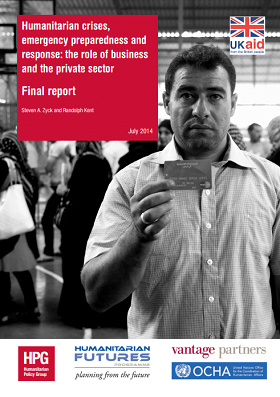
Humanitarian crises, emergency preparedness and response: The roles of business and the private sector – final report and case studies from Indonesia, Kenya, Jordan and Haiti
Report
The private sector has long been a major contributor to humanitarian action. At the community level, businesses frequently use their materials and resources to aid people affected by crises. As local markets recover and supply chains are repaired, crisis-affected people are once again able to access basic...
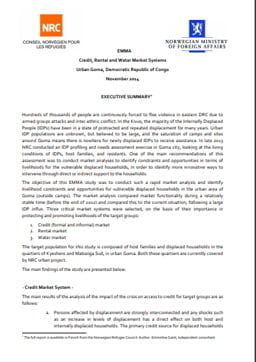
NRC – EMMA on Credit, Rental and Water Market Systems, Urban Goma, DRC, Nov 2014 – Executive Summary
Report
Hundreds of thousands of people are continuously forced to flee violence in eastern DRC due to armed groups attacks and inter-ethnic conflict. In the Kivus, the majority of the Internally Displaced People (IDPs) have been in a state of protracted and repeated displacement for many years. Urban IDP...

Using Ona and Open Data Kit to Build Mobile-based EMMA Market Assessment Questionnaires
Report
Purpose of this document
• To build a mobile data collection system to improve the speed and quality of market assessment data collection and analysis.
• To provide field assessment teams with ready-to-use guidance on developing and/or adapting market questionnaires without the need for in-person...

Social Transfer Programme in Nepal: An overview
Presentation
A overview of the social transfer programme in Nepal.

Is Cash Transfer Programming ‘Fit for the Future’? – Final Report
Report
This report presents the results of a 2013 research study entitled, Is Cash Transfer Programming ‘Fit for the Future’? The research was commissioned by the the CALP Network and undertaken by the Humanitarian Futures Programme (HFP), King’s College London. The project intends to understand...

Market Analysis for Preparedness and Development: Piloting Innovation in Guatemala
Report
This case study charts the process, successes and learning from Oxfam’s pilot joint market analysis in Guatemala 2013. One of the key lessons is that, despite the initial reluctance to market based programming approaches, a critical impact of the assessment has been increased interest from other...
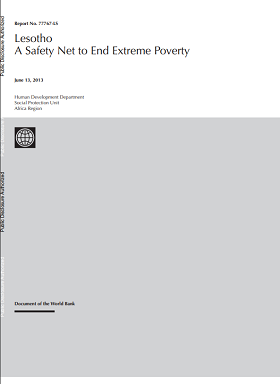
Lesotho: A Safety Net to End Extreme Poverty
Report
The objective of this study is to help the government to decide what role safety net and transfer programs should play in the coming 5 to 10 years. It seeks to answer three questions: Can increased spending on transfers accelerate poverty reduction in the medium to long term? Which groups and aspects of...